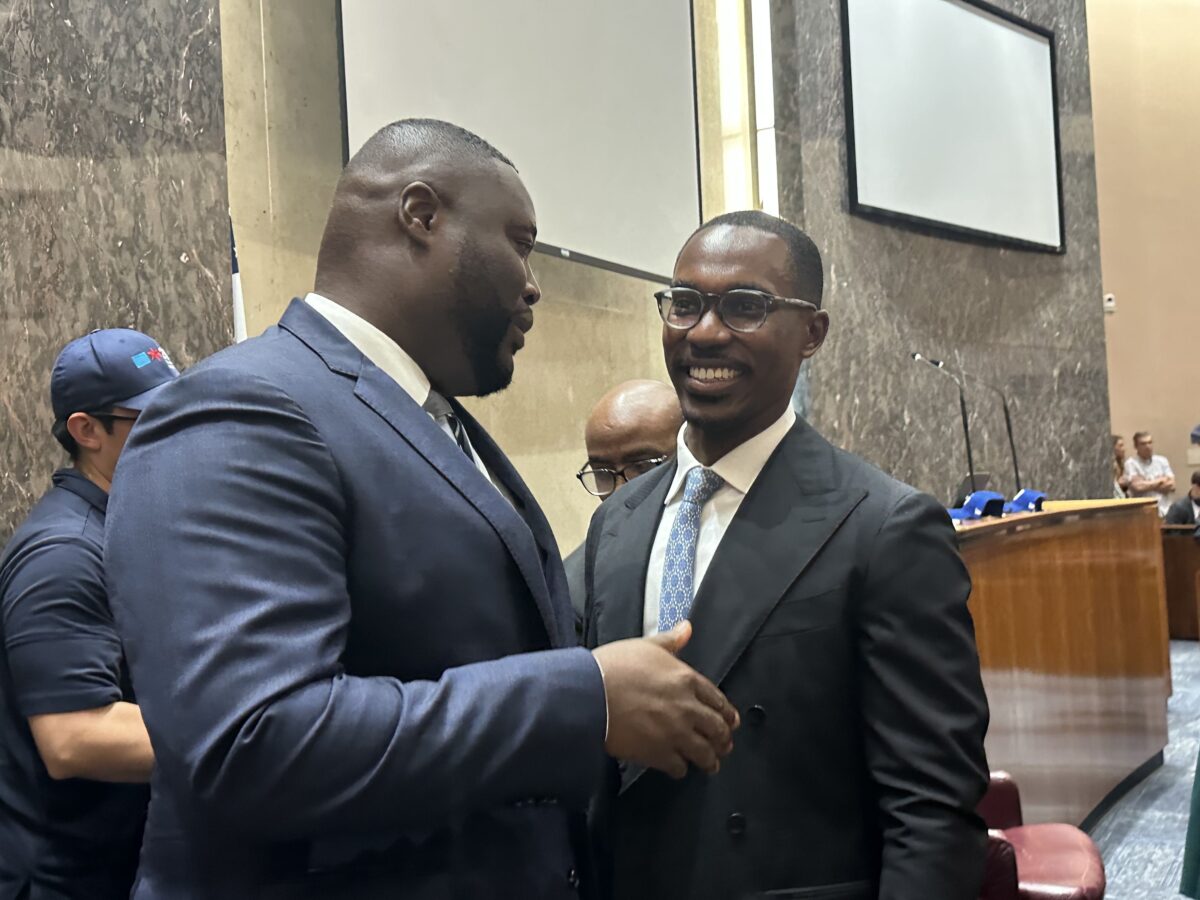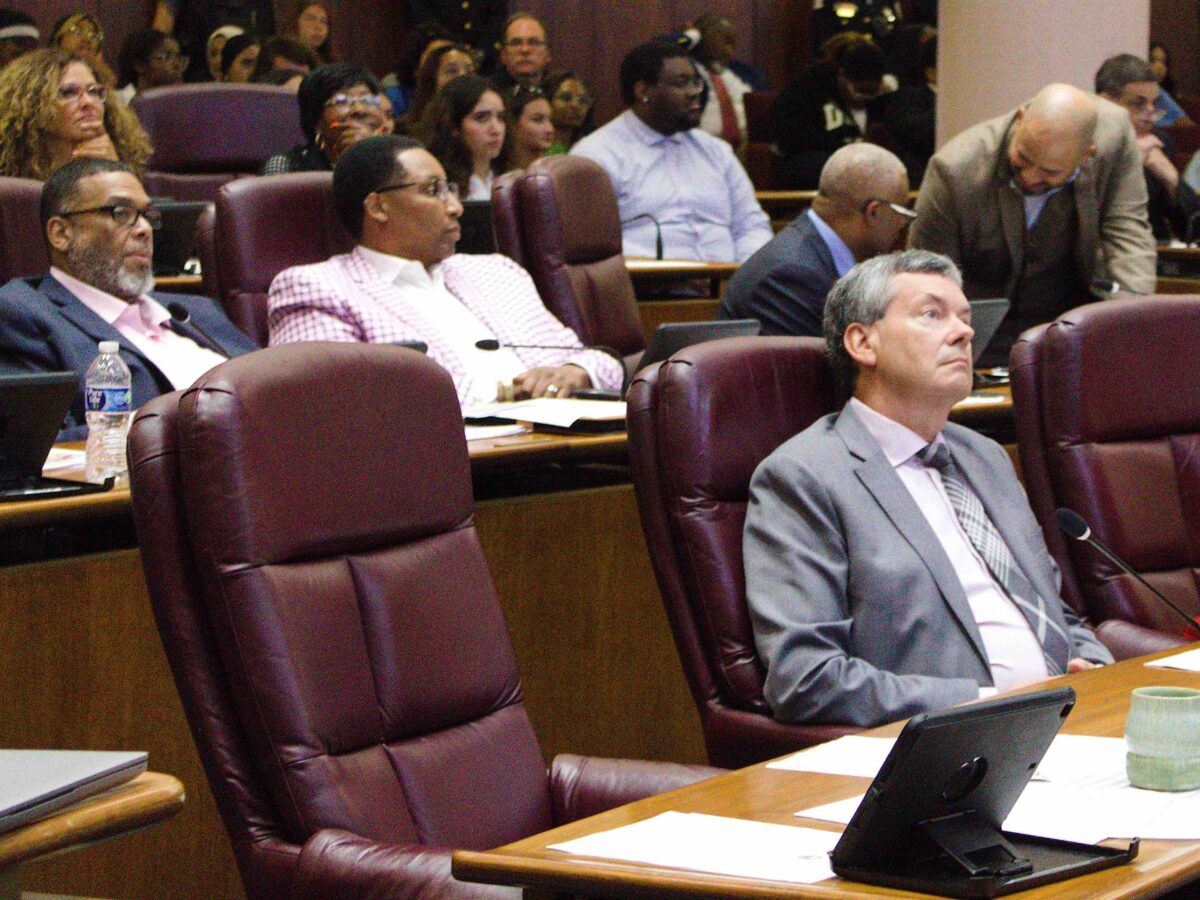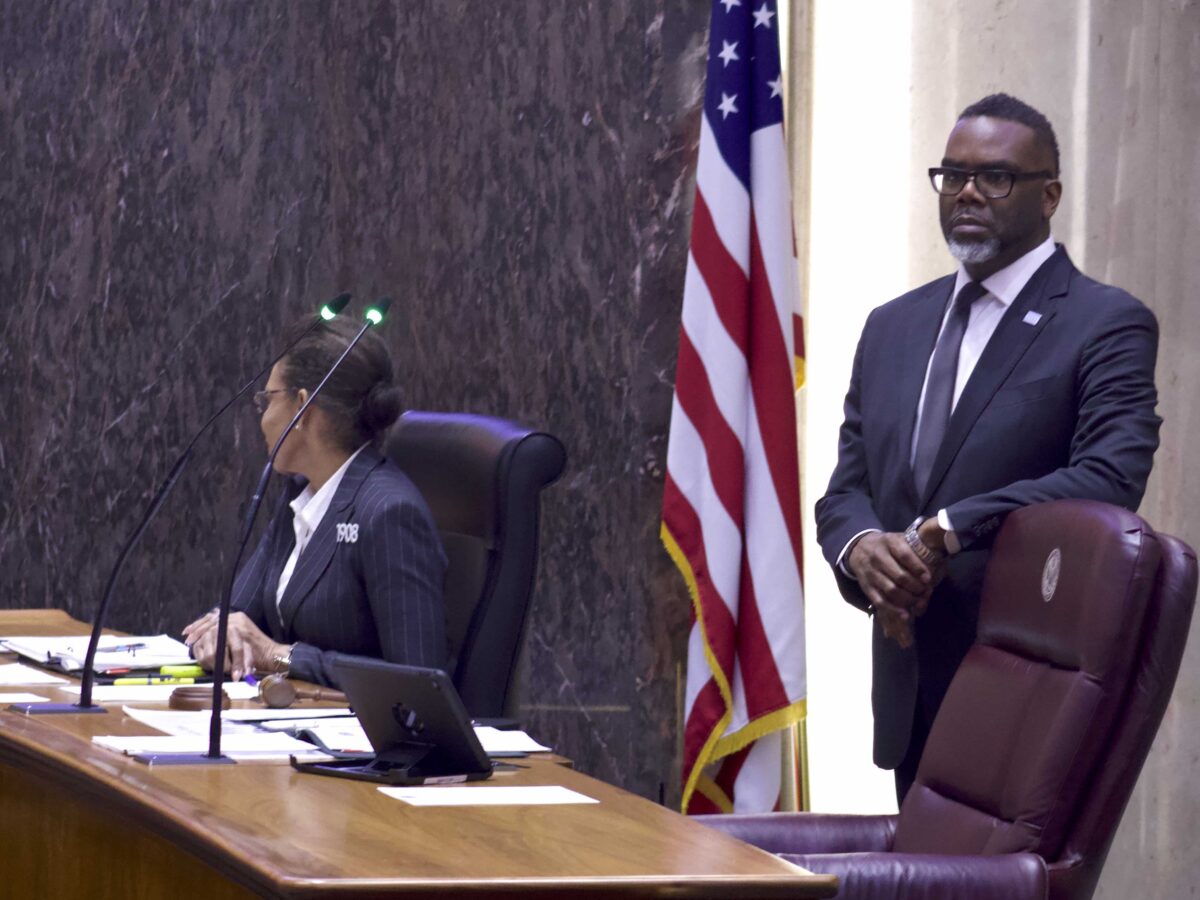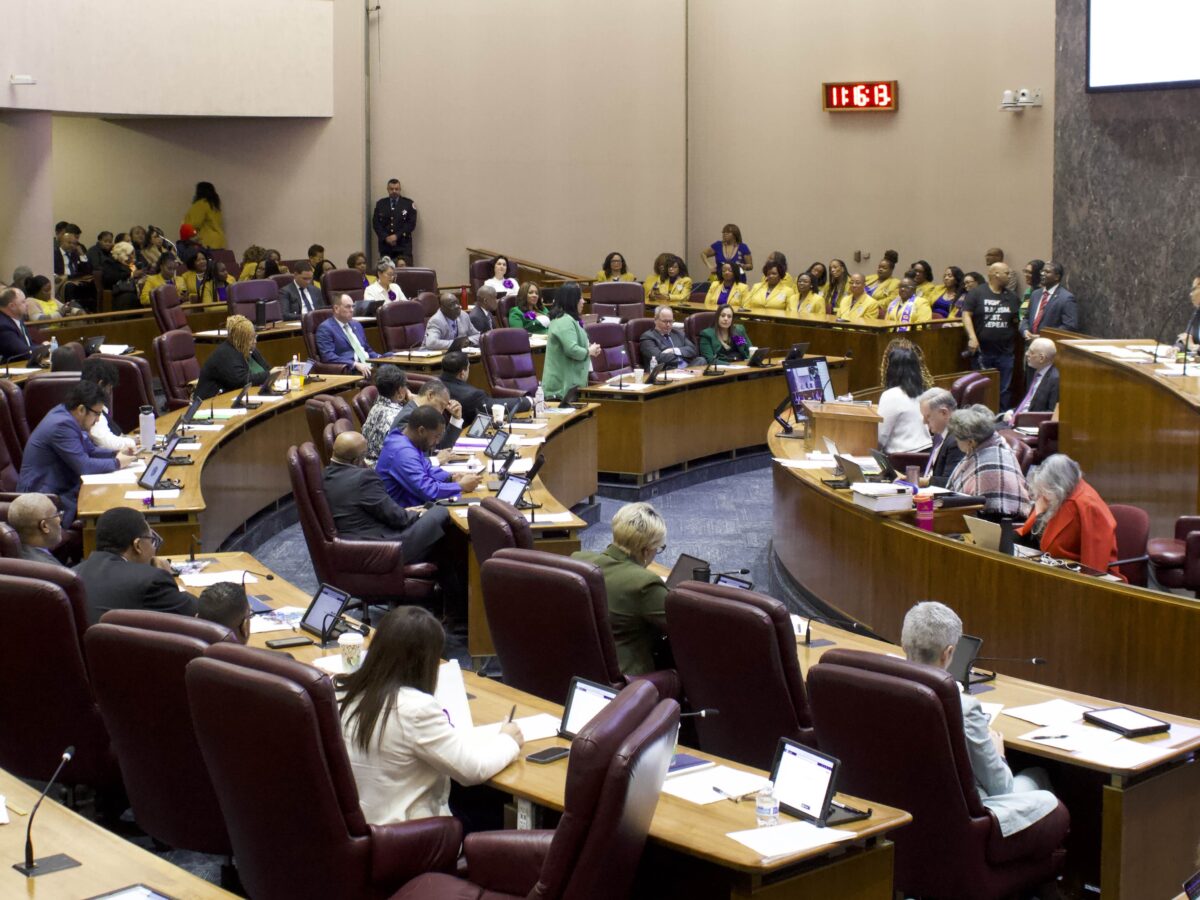On Thursday, the City Council voted 47–0 to confirm Walter Redmond Burnet III as the new alderperson of the 27th Ward. Burnett III will take over the seat from his father, who is seeking the top post at the Chicago Housing Authority. The twenty-nine-year-old alderperson kept his comments brief after taking the oath of office, expressing his excitement and readiness to get to work.
After taking photos with his family, the elder Burnett grabbed the Bible they had used for the younger Burnett’s oath, put on his fedora and made his way out of the Council chambers.
“Alright, Alderman Burnett. I’ll talk to you later,” Burnett said to his son, adding a joke about the work that would soon bedevil him. “I got a backed up sewer in front of my house.”
“We’ll get somebody on it,” the younger Burnett quipped.
Burnett III grew up in the 27th Ward but spent much of his professional career in New York City, where he worked in investment banking and real estate, Block Club Chicago previously reported. But while his connection to the 27th and his bona fides qualify him for the role as alderman, it’s how he got the job that rubs Dick Simpson the wrong way.
“He still got the position through nepotism,” said Simpson, a professor emeritus at the University of Illinois Chicago and former alderman of the 44th Ward. “The mayor only appointed him and the City Council only approved him because of his father. So that’s, unfortunately, a frequent practice in Chicago, for instance.”
Simpson pointed to former Mayor Richard M. Daley, the son of Richard J. “Boss” Daley, as one example of the Chicago way of nepotism. The tradition doesn’t stop there. When Alderman Dick Mell retired from the 33rd Ward in 2013, then-Mayor Rahm Emanuel bequeathed the seat to his daughter, Deb Mell. Mayor Lori Lightfoot chose Monique Scott to fill her brother’s 24th Ward seat after Michael Scott Jr. resigned to accept a job with Cinespace Chicago Film Studios.
Even in longtime newspaper columnist Mike Royko’s time, nepotism in Chicago was already an integral part of the political machine, so much so that Royko made a Biblical reference when describing those in power. “Edward Dunne, mayor, begat Robert Jerome Dunne, judge;” he wrote, “John J. Touhy, ward boss and holder of many offices, begat John M. Touhy, Illinois House Speaker.”
Political appointments shouldn’t advantage the children of elected officials, Simpson said. “They can make their way in other areas, [but] we can’t outright prohibit them by law,” he added. “That would not be a good idea, but in practice, we shouldn’t do it as often as we do in Chicago.”
The elder Burnett’s resignation left a power vacuum in City Council, setting off a game of committee musical chairs that was still going throughout the morning and into the late afternoon. The Black Caucus and Latino Caucus grappled over who would take on Burnett Sr.’s powerful zoning committee chair as well as his position as vice mayor. Outside the Council chambers ahead of the meeting, alders huddled to discuss the remaining chairperson spots on the Immigrant and Refugee Rights Committee and the Pedestrian and Traffic Safety Committee. By the time the Council started regular business at nearly 4:30 p.m., the chairs were still up in the air.
The indecision echoed an earlier episode under Mayor Brandon Johnson’s watch, when 35th Ward Ald. Carlos Ramirez-Rosa’s resignation left his zoning chair open. When asked why he and Council members were struggling to assign the committee chairmanships, Johnson grew defensive.
“Who told you that?” Johnson shot back after a reporter said an alder had told him the Mayor’s Office was not speaking with enough Council members.
“Someone said that I’m not speaking to all members of the different caucuses that are working in there. That’s just dishonest,” Johnson, rattling off a series of his administration’s accomplishments. “I hear you, but the government is still functioning.”
The Council approved $90 million in settlements for 176 police misconduct lawsuits involving disgraced former Sgt. Ronald Watts, who served twenty-two months in prison after pleading guilty to stealing from an FBI cooperator in an undercover sting. According to city attorneys, the cost of litigating all the lawsuits against Watts, who has been accused of planting evidence and who admitted to extorting drug dealers, could have been as high as $500 million.
Mayor Johnson was able to notch at least two major legislative wins on Thursday with the passage of additional dwelling unit (ADU) legislation and a $6 million community benefits agreement that promised to curb the effects of gentrification from the Obama Presidential Center, which is slated to open in 2026.
Advocates for affordability in South Side neighborhoods near the Obama Presidential Center celebrated the passage of the long-awaited community benefits agreement (CBA). “Our campaign isn’t about the foundation, it is about: Is the city going to do what it needs to do to ensure that everyone who lives here can stay,” said Dixon Romeo, the executive director of Southside Together. “Yesterday we took a step forward in that fight, and now thousands of residents will have more protections against displacement. This fight is not done: we have to get protections for the parts of South shore outside the pilot area, but we made progress and will continue the fight.”
As the center’s mausoleum-like tower has continued to rise across Hyde Park, so has the cost of living for nearby residents. Since 2015, median rents in the Jackson Park pilot area have increased by 43 percent and home values shot up by 130 percent, according to the Mayor’s Office. (The Weekly was unable to independently confirm those figures.) The measure will also give leasing preference to displaced residents and establish a property tax debt relief grant program for residents in Pilsen, Englewood, and South Shore.
Earlier in the week, acting zoning chair Ald. Bennett Lawson (44th Ward) had reached a compromise over the ADU ordinance, which South Side Ald. Marty Quinn (13th Ward) had scuttled in July. The legislation sought to expand on Chicago’s ADU pilot program, which allowed residents to build new detached rear coach houses or convert basements and attics into apartments. Quinn and others in the city’s bungalow belt opposed the measure, arguing it could threaten the character of single-family neighborhoods.
Under the revised ordinance, applicants for new coach houses must ensure that their general contractors participate in U.S. Department of Labor-registered apprenticeship programs. The legislation also maintains aldermanic prerogative—the practice of letting alders decide zoning matters in their ward—by banning new ADUs from single-family districts that were not included in the 2021 pilot program. However, individual alders can opt in and allow ADUs in those single-family districts if they so choose. The ordinance would go into effect April 1, 2026.
When asked whether the measure would preserve the controversial practice of aldermanic prerogative, Lawson pushed back.
“For those who want it,” he said. “We have a whole series of people I’ve talked to that want to put their whole ward in next month, right? We’ll have an expansion of that pilot zone starting next month, in anticipation of getting this rolling in the spring.”
The Council also approved a zoning change for a piece of real estate called “The 78” at Roosevelt and Clark that will allow the Chicago Fire to build a privately funded $750 million soccer stadium there.
Leigh Giangreco is a freelance reporter based in Chicago. You can follow her work on Twitter/X @LeighGiangreco and at leighgiangreco.com.




